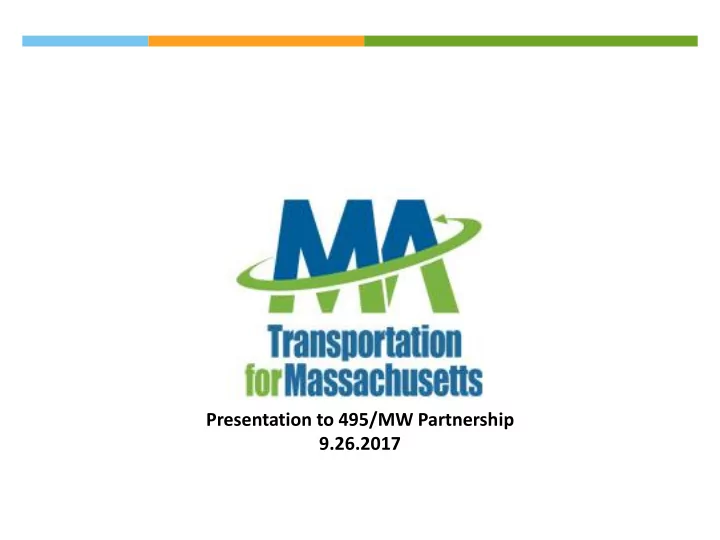

Presentation to 495/MW Partnership 9.26.2017
Who is Transportation for Massachusetts? • T4MA is a statewide coalition of more than 70 member and partner organizations. We advocate for better, smarter transportation policies across the Commonwealth. Our members include: • Environmental advocates • Planning agencies • Business associations • Community-based organizations • Grassroots non-profits • Transportation user groups and advocates
Our values for better transportation • Transportation is the path to opportunity and social equity • Transportation is a determinant of public health • Sustainable transportation is key to solving and mitigating climate change and local pollution • Good transportation choices create strong communities
Negative environmental impacts of transpo. • The transportation sector is the largest emitter of greenhouse gases • More than the power sector • This is now true not just in Massachusetts , but across the country • Significant contributor to local pollution • A study by Tufts and Boston University found that people who live close to highways have higher risks of cardiovascular disease
Coalition investment priorities • Transit • MBTA repair and maintenance • Targeted MBTA expansion • Regional Transit Authorities • Active Transportation for Vibrant Communities • Walking • Cycling • Roads + Bridges • Investment in maintenance + repair • Better management of demand and capacity • Tying Transportation to Land Use • Supporting “Great Neighborhoods” that are vibrant and prosperous, and easy to get around in without a car
The good news: Massachusetts is #1! Massachusetts is the #1 state in the country according to U.S. News & World Report rankings
Massachusetts is #1! #1 Overall #1 in Education #2 in Healthcare
But we rank #45 in transportation #1 Overall #1 in Education #2 in Healthcare #45 in Transportation
10
11 Congestion is a costly problem for Massachusetts commuters and businesses • Congestion costs Boston-area drivers $1,759 per year ($150/month) in lost time and wasted fuel. At $300/month for a household with two drivers, that’s more than what many pay for cellphones or cable television. • Boston-area drivers spent the highest percentage of their travel in congestion of any large-metro commuters in the country. • Business associations cite transportation as the number one concern of their members. Source: INRIX 2016 Global Traffic Scorecard. INRIX, a Microsoft spinoff, is a partner of FHWA and many state DOTs.
12 As volumes hit “peak of the peak”, average vehicle speeds drop Avg Vehicle Avg Vehicle Newtonville Eastbound Gantry Speed (MPH) Volume 6000 80 70 5000 60 4000 50 3000 40 30 2000 20 1000 10 0 0 12:00 1:00 2:00 3:00 4:00 5:00 6:00 7:00 8:00 9:00 10:00 11:00 12:00 1:00 2:00 3:00 4:00 5:00 6:00 7:00 8:00 9:00 10:00 11:00 AM AM AM AM AM AM AM AM AM AM AM AM PM PM PM PM PM PM PM PM PM PM PM PM Source: MassDOT volume and speed data from weekdays in May and June, 2017
13 Technology presents opportunities • The Baker Administration’s transition to all-electronic tolling presents an opportunity to think differently about how we can address congestion. • We can now take new approaches to old problems, and improve quality-of-life for commuters.
14 Congestion Reduction Pilot Proposal • Recruit ~500 commuters who regularly use currently tolled roads in Massachusetts • Provide approved pilot drivers with an automatic discount for driving off-peak on weekdays • Constrain pilot to small pool and time period to limit MassDOT revenue loss while still demonstrating proof of concept
15 Goals of the Pilot Program • Show technological capability to offer discounted tolls for off-peak driving • Demonstrate goodwill to toll-paying communities • Assess qualitative response of drivers to the opportunity to pay less for off-peak trips • Advance differential pricing as a policy that could potentially help alleviate congestion on some key Massachusetts commuting corridors
16 Potential Long-Term Benefits of Reduced Congestion Through Off-Peak Pricing • Drivers who take advantage of off-peak pricing: • Cheaper trip • Potentially faster and more reliable trips • Drivers who don’t (or can’t) take advantage of off -peak pricing: • Faster and more reliable trips through congestion reduction • Transit (bus) riders: • Faster and more reliable trips through congestion reduction
17 Appendix
Coalition revenue priorities • Millionaire’s Tax and Sales Tax • Congestion reduction through smarter pricing policies • Empowering cities and towns by enabling Regional Ballot Initiatives • Supporting a “RGGI for transportation”
A track record of success • Fought MBTA service cuts and proposed 43% fare hikes • Coordinated statewide campaign to win new revenue • Advocated for statewide Complete Streets program • Worked for Project Selection criteria to align investments with values • Frame innovative mobility in line with equity and climate values
Transportation must serve everyone • Transportation is important not for what it is, but for what it does: • Connects communities to each other • Connects people with jobs, healthcare, education, and other opportunities • Helps businesses move goods
21 At volumes above highway capacity, each new vehicle contributes more congestion than the last 45+ Minutes Travel Time at Peak from 495 to Back Bay 25 Minutes Without Traffic Highway Traffic Volume Capacity
22 Shifting trips away from “Peak of the Peak” produces significant travel time savings for commuters Reduction of 100 Vehicles Time Savings Reduction of 100 Vehicles “Peak of the Peak” Highway Capacity
23 Current Toll Rates w/EZ Pass $1.25 Tobin Bridge (each way): $1.50 Sumner + Ted Williams Tunnels (each way): $1.70 128/Weston to I-93: $1.00 Newton to Allston/Brighton: $1.85 Framingham to Allston/Brighton: $2.45 495 to Copley: $2.90 Worcester to South Boston:
24 Scenario Costs of the Pilot Program 500 500 # of Drivers: $0.50 $1.00 Average Discount: 10 45 Discounted Trips/Month/Driver: 6 6 Number of Months: $15,000 $135,000 Total Value of Discounts: Staff time for administration, media, marketing
Recommend
More recommend